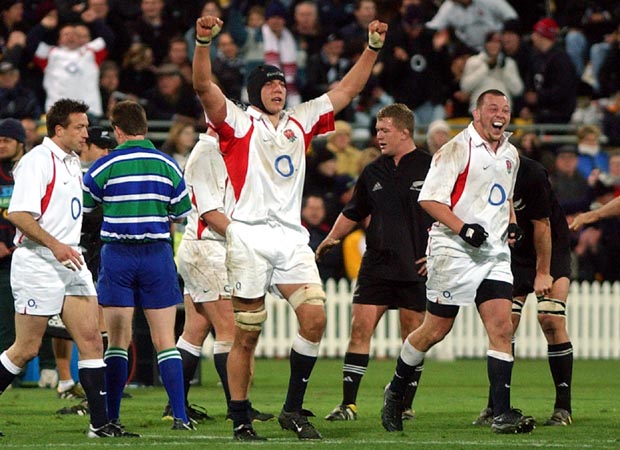 England have beaten New Zealand seven times in 39 meetings, which sounds like a modest enough record until you appreciate that they are the only Home Union to defeat the All Blacks in the last 61 years, and seven victories is still four more than Wales, Ireland and Scotland combined.
England have beaten New Zealand seven times in 39 meetings, which sounds like a modest enough record until you appreciate that they are the only Home Union to defeat the All Blacks in the last 61 years, and seven victories is still four more than Wales, Ireland and Scotland combined.
Obolensky’s famous match of 1936 was the occasion of England’s first win, the dashing Russian Prince scoring two of the best tries ever seen at Twickenham – strangely they were the only Test tries he was ever to score.
Obo was of an era. His student life consisted unashamedly of wine, women and song and unsurprisingly he only just scraped a fourth-class Honours degree in Politics, Philosophy and Economics at a time when it was almost impossible to fail your finals.
Although his preferred pre-match snack of a dozen oysters might seem a tad dilettante, he took the actual rugby very seriously and even commissioned a special pair of light handmade boots, more akin to athletics spikes, so as to maximise his searing pace.
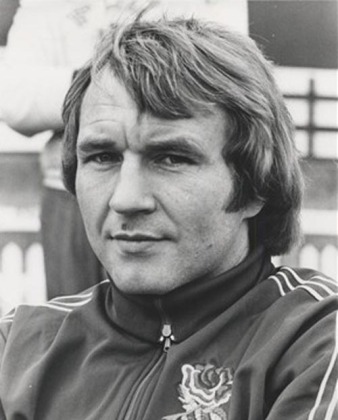
The Morning Post certainly didn’t hold back after England’s win: “We have never seen such a runner with such an innate idea of where to go and how to get there. His double swerve to gain his first try was remarkable enough but the extraordinary turn-in and diagonal right to left run which won him his second and which drew forth that great Twickenham rarity, a double roar of applause, will never be forgotten by anybody who saw it.”
England had to wait 37 years for their next win when John Pullin’s side headed down to New Zealand – unheralded and underrated – and responded with a cracking 16-10 win with Tony Neary, Neil Squires and Cornish prop Stack Stevens all crossing for tries. Possibly the definitive image from the game was England’s other prop Fran Cotton setting off on a 60-yard break down the left touchline with one memorable dummy that would have not have shamed Phil Bennett.
“We hadn’t won any of the provincial warm-up games and we only scraped a win over Fiji on the way down so for once New Zealand definitely underestimated us,” recalls Pullin. “I was pretty hopeful, though. We had played well in those defeats and we were a battle-hardened bunch. As a team we were exceptional that day but nobody was better than Jan (Webster) and John (Watkins). Unfortunately neither got treated very well by the selectors in the years to follow.”
Fast forward to 1983 and England’s 15-9 win over New Zealand which was very much a redemption game for skipper Peter Wheeler who unaccountably had been overlooked – both as a player and captain – for the 1983 Lions tour to New Zealand a few months earlier.
Revenge was sweet for the Leicester hooker as indeed it was for lock Maurice Colclough who had lost his starting spot for the Lions during the tour. Colclough, who had returned from France and was playing for Wasps by this stage, forced his way over for England’s solitary try.
There was another ten-year gap before England struck and again personal redemption played a part. By his own admission the 1993 Lions tour to New Zealand was a career lowlight for Will Carling but he got back on the horse spectacularly in November that year when he led England to another 15-9 win.
“We hadn’t gone well in the Five Nations either so it was a massively important win for the team while personally it was also bit of a ‘moment’ after a very tough year. I had been England captain for five years and it was becoming a very pressurised job on and off the field. I was beginning to question it all . . .and then came this win over the All Blacks at a packed Twickenham on a perfect winter’s day; the fans spontaneously singing Swing Low when the All Blacks started their haka. All that stuff. Wonderful.”
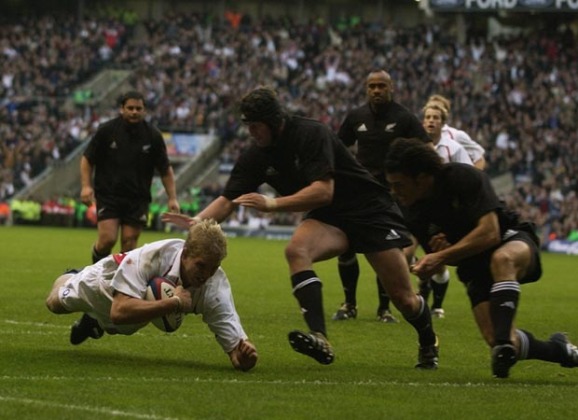
The next two wins belong to Clive Woodward’s England, both at key times in the build-up to the 2003 World Cup. Their 32-31 victory at Twickenham in November 2002 was a classic Test match with two exceptional teams going head to head and exactly a year out from the World Cup in Australia sent out a strong message.
“If England were serious about winning the World Cup a year later, there was no doubt in my mind that we had to defeat New Zealand, Australia and South Africa in November 2002,” recalls Woodward. “Against New Zealand you will do incredibly well to ‘nil’ them so our philosophy was that we had to plan on scoring a few tries ourselves.
“We did everything at pace – speed of foot and mind. Quick lineouts, Jason Robinson throwing the ball to himself on one occasion, Matt Dawson on the tap and go, quick release of ball at the base of scrums and rucks. Give the opposition no time to settle, no respite. Even the All Blacks were going to find that a challenge.”
Six months later England reinforced that message when, tired at the end of the season and down to 13 men at one stage, they ground out a 15-13 win at Wellington. As a result England travelled to the Australia World Cup with no mental hang ups whatsoever. Not one ounce of fear.
And so the last win on the ledger, that extraordinary 38-21 win two years ago which outwardly seemed to come from nowhere although talking to the players afterwards to a man they insisted they could feel it building that week in a way they had never experienced before.
There is no question that happens sometimes. Right place, right time, right vibe. Trying to predict when that is going to happen against New Zealand is another question altogether though.
1936 – England 13 New Zealand 0 (Twickenham)
Will always be known as Obolensky’s Match on account of the Russian Prince’s two brilliant tries. The second is much replayed but go to Youtube and tell me his first try wasn’t actually the better score. It was 37 years before England tasted success again.
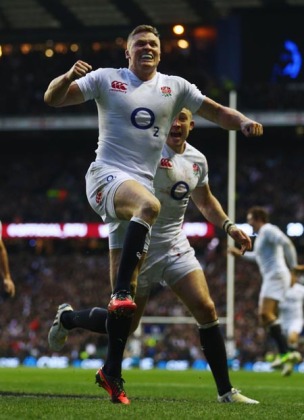
1973 – New Zealand 10 England 16 (Eden Park)
England bossed the game as scrum-half Jan Webster and flanker John Watkins enjoyed the games of their lives. Three tries from Webster, Tony Neary and Peter Squires – although you wouldn’t want a modern day TMO looking too closely at the latter.
1983 – England 15 New Zealand 9 (Twickenham)
Redemption for England skipper Peter Wheeler who had been omitted from the Lions tour that summer. A rare try for Maurice Colclough and the kicking of Dusty Hare saw England home rather more easily than the score suggests against a sub-par All Blacks.
1993 – England 15 New Zealand 9 (Twickenham)
Skipper Will Carling bounced back after a miserable time on the ’93 Lions tour. The game was also noteworthy for a cynical stamp by Jamie Joseph on debutant Kyran Bracken’s ankle. Bracken bravely soldiered on to become England’s new pin-up.
2002 – England 31 New Zealand 28 (Twickenham)
World Cup hopefuls England threw down the gauntlet to their most dangerous opponents in a wonderful game in which both sides fired on all four. There were memorable tries for Jonny Wilkinson (his best ever Test try), Ben Cohen and Lewis Moody.
2003 – New Zealand 13 England 15 (Wellington)
Just to ram home the message England won an ugly game but a Rorke’s Drift of a performance with England down to 13 men at one stage. Jonny’s goal kicking on a windy night was nigh on miraculous and ultimately saw England home.
2012 – England 38 New Zealand (Twickenham)
Disappointing defeats against South Africa and Australia, Chris Robshaw‘s England threw off the shackles and produced a wondrous performance. Tries for Chris Ashton, Manu Tuilagi and Brad Barritt as the ABs crashed to defeat.


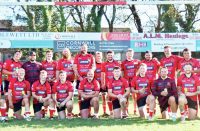
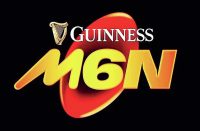
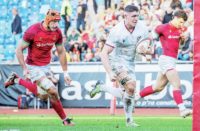



















Pingback: วิเคราะห์บอล